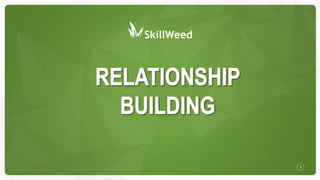
Keys to effective relationship building
- 1. 1
- 3. People who have a best friend at work are seven times more likely to be engaged in their jobs. People who simply have a good friend in the workplace are more likely to be happy. Good work relationships are linked to better customer engagement and increased profit. Job performance increases with effective relationship at work.
- 4. Improves motivation, productivity and employee engagement. Employees are willing to work together, which leads to high-quality work. There is a positive atmosphere in the workplace. Employees associate work with more positive feelings, which improves performance.
- 5. Strengthen Self-Awareness Connect With Others at All Levels Acknowledge Conflict Assessing your own abilities by paying attention to how you interact with coworkers. It helps you expand view of the people. Successful executives involve others by connection. Start by being realistic. Good relationship skills can keep conflict and disagreement to a minimum.
- 6. Trust - Makes one to be open and honest in thoughts and actions Respect - Value one another's input, and find solutions based on collective insight, wisdom, and creativity. Self-awareness - Taking responsibility for your words and actions, and not letting your own negative emotions impact the people around you. Inclusion - Don't just accept diverse people and opinions, but welcome them! Open communication - All good relationships depend on open, honest communication
- 7. Interpersonal Skills - They form good and strong work relationships. involve being able to consider another person's point of view, expressing appreciation when it isn't warranted, and showing concern for coworkers. Non-Verbal Communication Skills - Learning to interpret body language, for example, can help you pick up on other people's feelings and emotions. Verbal Communication Skills - You can improve your verbal communication skills by contributing suggestions and asking questions. Listening Skills – This is more beneficial than learning how to communicate in a meeting. Empathy - includes seeking to understand thoughts and emotions of others. Emotional Intelligence Networking skills Team building
- 8. Be self-aware - Knowing your strengths and weaknesses, and the impact that your behavior has on others. Be willing to delegate important tasks and decision-making. Have strong interpersonal skills. Have a participative management style - listening skills and communication to involve others, build consensus, and influence decisions. Give constructive, effective feedback.
- 9. It separate a successful executive from the rest Relationship skills are critical in the workplace. Without solid relationships, a leader can have a hard time bringing a team together Collaboration is only an effective workplace tool if the people who are collaborating can get along. The leadership skills needed in the future include what was once referred to as the “soft skills” of the workplace because they’re what lead to actual influence in the office.
- 10. Get outside of your head to understand what others experience - Leaders have narrowed their focus to those things that demand their attention, making others always feel disconnect, becoming disengaged in the work they do, resulting in a loss in potential and productivity. There is need to make the conscious effort to take a step back to consider the realities and challenges our employees face, as well as the opportunities they notice where they can make a difference. Move beyond seeing people based on their titles or roles - It helps us to not only understand what they hope to accomplish, but also what would make them feel like they’re contributing in a meaningful fashion Understand and develop true strengths - There’s greater value to be found in focusing on building our strengthens than getting mired down in trying to constantly overcome our weaknesses.
- 11. 11 Breakout Session 1. What challenges you might experience when building effective relationship in your work place? 2. As a leader, you may find some practical ideas that are more effective in difference working environment, kindly discus. 3. Non-verbal communication helps in building effective relationship. Kindly discuss more about it.
- 12. Build a Culture Of Listening Set Clear Expectations Ask Questions enhances teamwork on ideas and innovations. Develop Shared Value – It creates a mutual bond among participants. Learn to Recognize Emotions Be a Leader- Creating a positive work environment begins by providing transparency, behaving professionally, and knowing your leadership style. Get Involved
- 13. 13 Reference: Keys to effective relationship building ppt
- 14. 14 Thank You!!! Contact us: info@skillweed.com
Editor's Notes
- If you work for a company…any emails written belong to the company…not you. The company can view what you do on your computer screen from a different part of the building! Be careful what you write in EMAIL!!!!
- If you work for a company…any emails written belong to the company…not you. The company can view what you do on your computer screen from a different part of the building! Be careful what you write in EMAIL!!!!
- If you work for a company…any emails written belong to the company…not you. The company can view what you do on your computer screen from a different part of the building! Be careful what you write in EMAIL!!!!
- If you work for a company…any emails written belong to the company…not you. The company can view what you do on your computer screen from a different part of the building! Be careful what you write in EMAIL!!!!
- CLICK ON THE GRAPHIC TO VIEW A QUICK VIDEO!!!!!
- -Using bullets and numbers/writing your email in a partially outlined format is easier to read than a chunk of information.
